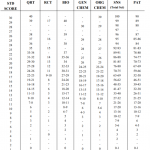Have you ever wondered about when to take the DAT? In many cases, working out the best time to take your dental admission test can seem difficult, but this shouldn’t have to be the case. With this thought in mind, we’re looking at some of the key things you should know about when to take the DAT and how to prepare. Hopefully, this will help give you the information you need to know when to take part.
What we will cover?
Why timing your DAT is important?
The DAT is a specialist assessment that’s designed to test whether a student has the suitable skills and knowledge to begin studying to become a dental consultant or dental care provider. The assessment covers numerous fields, including the sciences (biology, organic chemistry, and general chemistry) and analysis abilities.
Taking the DAT isn’t a cheap step, and the costs will often cost around $500 just to enter and receive your scores. This doesn’t cover any additional charges associated with the assessment, such as the cost of tuition. Due to the high cost of the entrance examination, timing your DAT to ensure you’re getting the best possible results is crucial. After all, although you are welcome to retake the assessment if you don’t get a suitable score, it’s costly. You can retake the DAT after 90 days, but this may be cost-prohibitive; moreover, some dental schools may still look at all of a candidate’s test scores, not just the highest one.
When is the Best Time to Take the DAT?
We’ve clarified that taking the DAT again can be costly. But when is the best time to take the DAT to increase the chances of getting through the test?
Well, there are two main times when people choose to take the DAT, and these can offer unique pros and cons. As a result of this, there’s no guarantee that either will necessarily be a better choice. Thus, when considering whether or not the time is right to take the DAT, you should be careful to consider whether you will be prepared and ready to take the test.
Key Considerations Before Booking your DAT
Some of the key considerations you should make when deciding on the best time to take the DAT include:
– Preparation time: While you may be able to take the DAT without studying for it first, it’s important to keep in mind that this is not recommended. Indeed, the test itself covers a wide range of topics. Just a few of these include biology, general chemistry, organic chemistry, perceptual ability, and quantitative reasoning. As such, in most cases, studying for the DAT takes several months, especially if there are topics you need to work on.
– Current study level: There’s nothing to say that you can’t apply for the DAT at a time that works for you. However, if you are still in the process of studying some of the key topics – such as organic chemistry – it may be more prudent to wait until after you’ve finished covering this topic to help. After all, while the DAT is multiple choice, relying on guesswork alone is unlikely to result in a good score.
– Other commitments: When applying for the DAT, it’s crucial to recognize whether you have other commitments that could interfere with your DAT. Fortunately, if something comes up, it is possible to reschedule the DAT, although fees may apply if attempting to reschedule at the last minute.
These are just a few of the things you may want to keep in mind. So, when booking your DAT, remember these to choose the right entry time for you. But, if you need to reschedule, try to allow as much time as possible to reduce the chances of getting charged extra.
After Your Sophomore Year
Once you’ve completed your sophomore year, you could consider taking your DAT. If this is the choice you’re looking at, make sure to allow much more preparation time since you’ll still need to learn and study some of the key principles. However, you should have most of the topics down, at least to a degree, by now. As a result of this, applying after your sophomore year can be a good option if you have time to complete some additional self-study.
A key benefit of this approach is that it’s all done by the time you complete your application. Better still, the DAT examinations are usually valid for around two years after your exam date. As such, you’ll still have plenty of time to apply and complete the process.
Completing the DAT now also means you’ll have more time to finish studying for your other assessments after. This can help spread out the examinations and take some of the pressure off your revision time.
After Your Junior year
A more common time to take the DAT is after your Junior year. The reason for this is perhaps unsurprising; you’ll usually have a much more thorough knowledge of the topics by this time. However, this comes with a few big challenges.
Firstly, checking that your DAT won’t clash with your other examinations is crucial. After all, you won’t get into dental school on your dental admission test alone.
Secondly, it’s also worth looking at the time of your application. Leaving things until your junior year doesn’t necessarily give you much time to work with for completing your applications. As such, you’ll need to make sure you book the assessment as soon as possible. And don’t forget: leaving it late means you may have less leeway to reschedule.
Will my Dental Application Be Processed if I Haven’t Completed the DAT?
When deciding whether to book your DAT, remember that your dental application likely won’t be looked at until you’ve finished the assessment.
Of course, this will all come down to your chosen dental school’s specific requirements and policies; while some may be willing to consider an application without the DAT score, most won’t. Moreover, even among schools that will, your application probably won’t be allowed to complete until the DAT scores come through. In most cases, this will be a straight “no,” whereby the school will only look once the DAT comes through.
With this thought in mind, while you should never rush into the test, taking it as early as possible can help. Try to allow plenty of time for your scores to be processed and forwarded to your dental schools.
Don’t Forget to Book Tutoring or Study Time for your DAT First
Before booking your DAT, ensure you’ve allowed enough time to thoroughly study all the topics. Even if you have already covered these topics before, you’ll want (at minimum) several weeks of solid revision time.
Ideally, allow several months of revision time or more to cement the principles of the DAT firmly in your mind. Some of the core topics you will need to understand and be able to discuss as part of your DAT and dental admission process include:
– General Biology
– General Chemistry
– Organic Chemistry
– Molecular and Cell Biology
– Human Anatomy
– Developmental Biology
– Evolutionary Biology
– Genetics
You also need to give special attention to PAT section, which is unique to DAT. These are just a few of the different topics that can all prove valuable as part of your DAT. Of course, the more skills you can demonstrate, the better. So, if you have the opportunity to complete any additional courses alongside your education, these may prove useful. Remember: dental school admissions can be very competitive. As a result of this, the more you can make yourself stand out from the crowd, the better your chances may be.
- One of the most popular DAT programs known for its Bootcamp approach.
- High-Quality Video lectures. Chemistry lessons are top-notch.
- Customizable practice questions and study plans. Helpful video explanations for hundreds of questions. Good for visual learners.
- Most realistic practice test compared to others.
- Bootcamp Pro $497, Plus Plan $897
Final Thoughts
The DAT can often be a challenge, but this shouldn’t have to be the case. With this thought in mind, if you’ve had questions about when to take the DAT, we hope today’s guide will have given you some ideas about where and how to start.
After all, taking the DAT when you’re not ready for it will only leave you in a difficult position. And, since the DAT costs hundreds of dollars to enter, you don’t want to risk losing that money simply by being unprepared.



Review Summary
User Reviews
There are no reviews yet. Be the first one to write one.
Share Your Experience